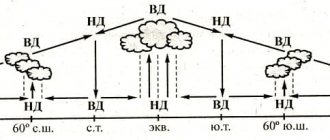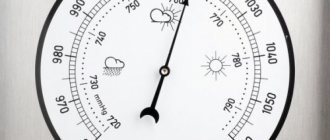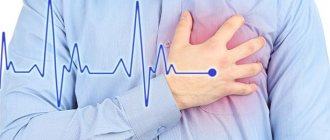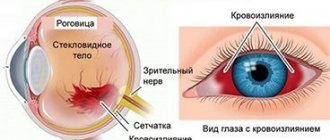Many people tend to attribute sudden attacks of headaches or general loss of energy to a change in weather. Patients with long-standing injuries often complain that before a thunderstorm, healed dislocations and fractures begin to hurt. According to WHO, about one third of the world's population believes that their well-being depends on weather conditions. But is this really so?
The International Classification of Diseases, which guides doctors when making diagnoses, does not include the terms “meteosensitivity” or “meteodependence.” Scientists and doctors continue to explore the relationship between weather events and exacerbation of chronic diseases.
What is weather sensitivity and weather dependence?
A person feels comfortable at a certain temperature, humidity and pressure. Changing any of these parameters can cause discomfort: for example, too dry air leads to drying of the mucous membrane of the nasopharynx, resulting in a cough. But the human body adapts well to various environmental changes: this explains why people in general tolerate changing climate zones and sudden changes in pressure that occur when taking off and landing an airplane or diving to depth.
The better developed the adaptive mechanisms of the body, the less a person pays attention to changes in temperature or pressure. Due to age-related changes, adaptation occurs worse; the situation is aggravated if there is a history of chronic diseases. A person does not become weather dependent, but his body adapts less well to changing weather.
Why do many patients believe that their well-being depends on weather changes? There are several reasons:
- self-hypnosis: the patient is sure that weather disasters affect his health, an additional stress factor arises, which “triggers” the exacerbation of a chronic disease;
- the tendency of people to connect different events: a person remembers attacks of illness longer if they occurred simultaneously with weather changes. Such episodes are stored in memory, and gradually a feeling of a relationship between the disease and the weather arises.
But doctors do not deny that a sharp increase or decrease in temperature can be dangerous in itself. For example, summer heat often leads to sunstroke and heatstroke, and winter cold coupled with physical activity increases the risk of heart attack. But weather change in itself does not affect either the physical or mental health of people.
Can weather affect health and well-being?
If a person does not have chronic diseases and adheres to a healthy lifestyle, a change in weather cannot affect his well-being. But prolonged rains, gloomy skies and lack of sunlight for several days can cause a decline in activity and affect the psycho-emotional state. From a physiological point of view, this is due to a slowdown in certain metabolic processes: for example, a decrease in the production of vitamin D.
If there is no confirmed scientific data on people's weather dependence, why is such a large percentage of the population confident that worsening weather affects their well-being? Typically, symptoms of meteosensitivity include:
- headaches and dizziness;
- decreased activity level;
- drowsiness or, conversely, insomnia;
- change in appetite;
- increased fatigue;
- sudden mood swings;
- apathy.
These signs can indicate a wide range of pathologies: from low levels of hemoglobin in the blood to diseases of the cardiovascular system. If you think your body is reacting to the elements, it's worth scheduling a preventive health checkup. Most likely, the doctor will determine the physiological cause of poor health.
To make a diagnosis, you will need to undergo an examination and a number of studies: for example, take general urine and blood tests, check biochemistry, and hormone levels. Often, “meteosensitivity” hides hormonal disorders. After the examinations, the doctor will make an accurate diagnosis, select treatment if necessary, adjust the diet, and develop preventive measures to maintain high vitality in any circumstances.
Should we expect improvements?
An anticyclone caused record atmospheric pressure and cool weather. The chief specialist of the Moscow Meteorological Bureau, meteorologist Tatyana Pozdnyakova told “360” that it formed over the north of Scandinavia.
“This is not a warm Azov anticyclone. This is cold air, which is always heavy. That is why this anticyclone develops and is replenished with portions of even colder air, as there is a flow from the Arctic. Therefore, atmospheric pressure has remained at record levels since Sunday,” Pozdnyakova said.
As a rule, in a winter anticyclone, cold air is formed in the lower layers of the atmosphere, and at the top it is warm. According to Pozdnyakova, the current anticyclone is high, the thickness of cold air exceeds five kilometers. This factor also affects blood pressure.
High atmospheric pressure will accompany Muscovites at least until the end of the week. Afterwards it will gradually begin to go east.
“It is possible that one will be replaced by another. A front with a small amount of precipitation will slip between them, and then the next anticyclone will form. Perhaps it will also have high atmospheric pressure, but it will not be record-breaking,” the meteorologist concluded.
Why does the pressure “jump”?
One of the myths of “meteosensitivity” is associated with the opinion that blood pressure depends on weather fluctuations and magnetic storms. In fact, scientists have not found any relationship between these events. Blood pressure can indeed change due to external changes, but only under extreme conditions, for example, when climbing mountains.
Moreover, cardiologists say that the increase in blood pressure itself should not cause any inconvenience to a person. Problems begin only if the patient already has diseases of the cardiovascular system. The only exception to this rule: a hypertensive crisis, in which blood pressure becomes so high that the patient begins to experience nausea, chest pain, and shortness of breath.
What reasons actually lead to changes in blood pressure?
- alcohol poisoning. “Hangover syndrome” is usually accompanied by high blood pressure - alcohol breakdown products cause cerebral vascular spasm;
- uncontrolled medication use. Some popular over-the-counter painkillers can cause blood pressure spikes. Before using any pharmacological drugs, you should consult a qualified physician. If you suffer from attacks of pain, painkillers should be prescribed by your GP;
- high level of stress. Psycho-emotional overload is one of the main risk factors for cardiovascular diseases. Cardiologists pay so much attention to mental hygiene and strongly encourage their patients to reduce their stress levels as much as possible.
“Jumps” in blood pressure often indicate the presence of some problems: for example, cervical osteochondrosis or kidney inflammation. If there are signs of frequent changes in pressure, you must make an appointment at a medical center, undergo appropriate examinations and determine their cause.
Why does arrhythmia sometimes worsen due to weather changes?
Despite the fact that a healthy person does not pay attention to changes in the weather, people with cardiovascular diseases react quite sharply to temperature changes. This is explained by a violation of the adaptive mechanism: chronic diseases of the heart and blood vessels weaken the body’s ability to adapt to changing environmental conditions. How does this happen?
For example, when the temperature rises (as happens in the summer heat), the vessels dilate, blood flows to the tissues and organs, which causes additional stress on the heart. Blood pressure may drop, causing symptoms such as dizziness, blurred vision, shortness of breath, and cold sweats. On hot days, people with chronic heart diseases, for example, those suffering from arrhythmia, are advised to spend as little time as possible outside, reduce physical activity, and drink more.
Cold also has a negative effect on cores. Vasoconstriction increases the load on the heart muscle, and blood pressure rises. If the vascular tissue is weak (with atherosclerosis), there is a high risk of vessel rupture, aneurysm, heart attack or stroke.
But a much greater risk is created by self-hypnosis: if a person believes that weather anomalies affect his health, the level of stress increases significantly. The heartbeat increases, the arrhythmia worsens. Its main symptoms appear:
- feeling of “interruptions” in the chest;
- chest pain;
- dyspnea;
- dizziness;
- loss of consciousness.
Taking natural sedatives and calm, deep breathing helps relieve anxiety. But in order to keep arrhythmia under control, it is necessary to undergo regular examinations with a cardiologist. The doctor will develop recommendations that will help weather-sensitive people cope with magnetic storms and other anomalies. Their influence can be compensated with the help of healthy lifestyle rules and medications.
What to do?
The first and main condition for reducing the manifestations of meteosensitivity is a healthy lifestyle as a preventive measure, notes most experts.
Controlling your diet (the less fatty foods, the better for the vascular system), walking in the fresh air and playing sports can improve your health and make your body more resilient, which, among other things, will reduce the negative effects of magnetic storms.
As a rule, meteorologists warn in advance about serious changes in atmospheric pressure. Those who usually overreact to such changes a few days in advance should prepare in advance. This includes establishing a daily routine and exercising; active physical activity during weather changes is not recommended.
Let's get promoted
Photo: Depositphotos
Natural changes: scientists advise Russians not to wait for “normal” weather
Moscow will continue to be covered by prolonged downpours
“Specifically during bad weather, you need to follow a drinking regime to thin the blood. You should also pay attention to nutrition and try to put off any diets and restrictions during bad weather conditions, maintaining the balance of KBZHU,” noted Vera Pavlova.
If possible, doctors ask people suffering from high or low blood pressure to stay at home and lie down more on such days. Hypertensive patients should avoid caffeine-containing drinks and switch to herbal teas. Hypotonic people, on the contrary, can afford coffee and dark chocolate.
It is recommended to reduce salt intake and give preference to foods containing iron, potassium, calcium and ascorbic acid.
Why do I get headaches when the weather changes?
Weather sensitivity is not an official diagnosis or disease: a healthy body normally tolerates any weather changes. If you notice that in cloudy weather you suffer from dizziness and headaches, this is an alarming signal indicating that pathological processes are occurring in your body. It is recommended to make an appointment with a neurologist or cardiologist.
Typically, headaches when the weather changes occur due to impaired vascular tone. Inside the skull, its own pressure is established (intracranial), the maintenance of which is important for the normal nutrition of brain cells. If vascular tone is disturbed (as, for example, with cervical osteochondrosis), a change in ambient temperature can provoke severe pain.
The mechanism of its development is as follows: temperature or pressure changes, in order to adapt to these changes, the vessels in the human body narrow or expand. But if their tone is disturbed, there are plaques on the walls or other pathologies are observed, this leads to circulatory disorders and changes in intracranial pressure. As a result, the patient may experience different types of headaches: from a “cotton-like sensation” to throbbing in the temples or migraine.
Pain can also be caused by an electrolyte imbalance. For example, if the air becomes humid, fluid accumulates in the body, which leads to an imbalance and can cause headaches. What to do in such cases?
To stop depending on weather changes, it is necessary to cure the disease: cope with osteochondrosis, restore vascular tone. To do this, you first need to understand why the body reacts sharply to temperature fluctuations. You can do this by making an appointment with a cardiologist or therapist at a medical center.
What heart problems can arise due to weather changes?
Changes in weather cannot disrupt the functioning of a healthy heart, but can cause an exacerbation of chronic cardiovascular diseases. Doctors identify two main types of weather that are dangerous for heart patients:
- spastic: characterized by an increase in air pressure with a simultaneous decrease in temperature. This can lead to exacerbations of hypertension, angina, and coronary heart disease. Many patients complain of severe headaches due to vascular spasms;
- hypoxic: characterized by a decrease in pressure at high temperatures. Such weather is easier for patients with chronic heart disease, and there is less risk of stroke, heart attack or hypertensive crisis. But at the same time, shortness of breath and dizziness may develop, since the concentration of oxygen in the air decreases, and mild symptoms of hypoxia occur. Even healthy people may feel more lethargic and sleepy.
Symptoms, not disease
Give it some heat: what weather saves you from coronavirus
Could a stormy summer trigger a surge in cases?
Weather dependence is usually understood as the body's reaction to sudden changes in atmospheric pressure. Despite the prevalence of this concept, it is not considered a disease in itself. Simply, pressure fluctuations intensify the symptoms of existing chronic diseases.
The most common problems faced by weather-sensitive people are headaches, dizziness, rapid heartbeat, loss of energy, mood swings, and joint problems. There may also be an increase in other chronic diseases - for example, if a person suffers from kidney problems, symptoms may become more noticeable at this time
Many doctors explain the body’s sensitivity to weather changes by the fact that in ancient times, a headache served as a kind of signal for people about an upcoming change in the weather - and therefore had a practical meaning.
Let's get promoted
Photo: Depositphotos
Now there is no need for this, so those who suffer in one way or another due to weather-related deterioration in well-being strive to reduce unpleasant symptoms.
Prevention of heart disease for weather-sensitive people
If you consider yourself to be a weather-sensitive person, this means that hidden pathological processes are occurring in your body - a healthy body easily adapts to changing weather without any unpleasant consequences in the form of pain or shortness of breath. The first thing that is recommended to do is to be examined by a cardiologist.
It is also recommended to consult a specialist in order to receive professional recommendations on the prevention of heart disease during sudden temperature changes. To feel good at any time of the year, you should:
- to refuse from bad habits. Smoking and alcohol create additional stress on the cardiovascular system. Abuse of alcohol-containing drinks in the heat is especially dangerous: alcohol causes cerebral vasospasm, and hot, humid weather retains fluid in the body;
- Avoid fatty, salty and smoked foods. These foods can also retain excess water in the body, disrupting the balance of electrolytes, increasing the symptoms of heart disease and worsening a person’s overall well-being;
- to live an active lifestyle. Regular physical activity strengthens the immune system, improves muscle and vascular tone, promotes blood microcirculation, and strengthens the heart muscle. As a result, the body’s adaptive ability increases: the body “rebuilds” more easily under changes in temperature and pressure;
- spend more time in the fresh air. Deep breathing saturates the blood with oxygen and relaxes, relieves vascular spasm. As a result, weather changes are easier to bear and less likely to lead to unpleasant consequences.
It is also recommended that all persons suffering from cardiovascular diseases regularly take vitamin complexes to maintain normal heart function.
1
0
2
Article rating:
2.33 out of 5 based on 12 ratings
Author: Luchinin Mikhail Yakovlevich
Cardiologist. Highest category, candidate of medical sciences. Work experience 31 years.
Meteor dependence in osteochondrosis
If you know the symptoms of spinal disease, you can avoid complications and pain due to climate change.
Causes of exacerbation of osteochondrosis
With osteochondrosis, the functioning of the joints in the spine is disrupted and the cartilage tissue is deformed. According to statistics, 8 out of 10 people on the planet suffer from this disease. It has been established that the disease not only leads to back problems, but also causes rapid aging of the skin.
The main causes of exacerbation of the disease include:
- Changing of the climate. When the climate changes, atmospheric pressure affects the spine, increasing the load on it.
- back massage. Violation of the massage technique or the client’s concealment of information about the disease can lead to serious problems and worsen the person’s condition.
- Stress. During stress, the nutrition of the intervertebral discs is disrupted, which leads to an exacerbation of the disease.
- Alcohol. Alcohol blocks recovery processes in the human body.
- Menstruation. At the beginning of the cycle, a woman’s body has a very low level of estrogen, and it is responsible for the condition of bone tissue.
- Strong physical activity. It is better for people with osteochondrosis not to bend sharply, lift heavy loads, or take long steps when walking.
The influence of weather on osteochondrosis
Even those people who do not suffer from osteochondrosis experience a deterioration in their health when the weather changes, because changes in atmospheric pressure lead to changes in blood pressure inside the body. Changing weather conditions affect the appearance of back pain in patients in the neck or lumbar region, since people with osteochondrosis are more susceptible to weather dependence.
In people with cervical osteochondrosis
spine, pain worsens with hypothermia and sudden temperature changes. Most often this happens in the fall. For those suffering from a disease in the area of the shoulder blades or lower thoracic region, there is a deterioration in health in winter or summer. That is, in the midst of cold or heat. In spring and autumn, there is an improvement in well-being, because during these periods there are no sharp temperature changes.
Symptoms of osteochondrosis
The main symptom of exacerbation of the disease is back pain
immediately after waking up. When changing position, the discomfort intensifies. Also, increased pain is observed when sneezing, coughing, laughing, raising the head and sudden movements. The pain can be sharp and short-lived, or aching and dull. It may go away during the day, but then return again. If osteochondrosis is in the cervical region, pain occurs with a sudden change in head position: tilting or turning. You may also experience tinnitus and crunching in your joints.
Some people experience decreased sensation in their toes or cramping, frequent urination, or incontinence. Girls may experience menstrual irregularities.
How to eliminate the influence of weather
The following tips will help alleviate your condition with osteochondrosis and reduce the influence of weather:
- Spend more time in a warm room without air conditioning. To protect yourself from the cold, you need to wear a hat and hood and tie a scarf around your neck.
- If you experience pain in your temples, a simple massage will help. Place your thumb and forefinger on both sides of your temples and make circular movements from your ear towards your eye. The massage should be light and leisurely.
- Maintain an upright posture while sitting and throughout the day. Level posture is characterized by the fact that the back and head are on the same line. Raise your head, spread your shoulders and squeeze your shoulder blades together. Don't forget about your chest and stomach: lift your chest and pull your stomach in, tensing your abdominal muscles. Try to constantly maintain this position to achieve results.
- Try to eat a balanced diet. It is better to exclude sweets, salty foods, white bread and fatty foods during periods of exacerbation of the disease. First of all, refined sugar is excluded, as it leads to leaching of calcium from the bones. Try to eat more vegetables and fruits that contain vitamins C, E and B3. In addition to fruits and vegetables, fish, legumes, seafood, nuts, eggs and chicken will help diversify your diet. You can also use low-fat kefir, yogurt or cottage cheese.
- Watch your excess weight. Extra pounds increase the load on the spine.
- With osteochondrosis, it is important to sleep only on an orthopedic pillow and cover yourself with a warm blanket. You can go to bed in warm pajamas or take a heating pad to bed.
- Stay outside a warm room or in the cold as little as possible, do not sit on cold and damp ground or concrete slabs.
- If you have pain in the neck, do not turn your head sharply, so as not to create additional stress on the cervical spine.
Finally
If you follow all the recommendations for alleviating the symptoms of osteochondrosis, then you can live with it without deteriorating your quality of life. Staying warm most of the time, using a special pillow and massaging your temples will help relieve pain and continue to enjoy life. The weather affects the exacerbation of the disease, as the atmospheric pressure changes and the load on those parts where there are disorders in the joint tissues increases. During such periods, you can prevent the onset of pain and reschedule plans for another day, if possible, or dress warmer than usual. It is better to cancel training on such days and give preference to therapeutic exercises (physical therapy).
All these rules should be followed not only by patients with osteochondrosis, but also by healthy people to prevent the disease.
The spine is the foundation of our body, so it is necessary to monitor its health regularly. Author: K.M.N., Academician of the Russian Academy of Medical Sciences M.A. Bobyr









